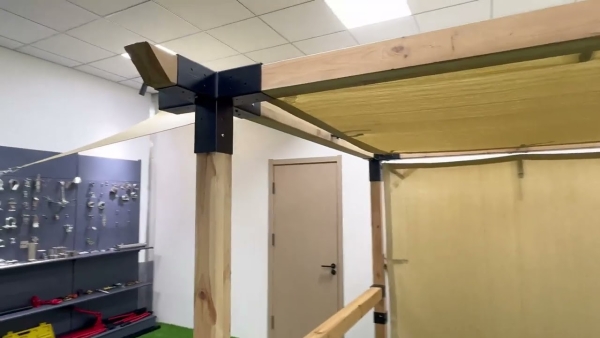Table of Contents
Benefits of Obtaining Planning Permission for a Pergola
When considering adding a pergola to your property, one of the key questions that may arise is whether or not you need planning permission. While it may seem like an unnecessary step, obtaining planning permission for a pergola can actually have several benefits. In this article, we will explore the advantages of obtaining planning permission for a pergola.
First and foremost, obtaining planning permission for a pergola can help ensure that your structure is built in compliance with local regulations and building codes. By obtaining approval from the relevant authorities, you can be confident that your pergola meets all necessary safety standards and will not pose a risk to yourself or others. This can provide peace of mind and help avoid any potential legal issues down the line.
Additionally, obtaining planning permission for a pergola can help protect the value of your property. A pergola that has been built without proper approval may be considered an unauthorized structure, which could potentially lower the value of your property. By obtaining planning permission, you can ensure that your pergola is seen as a legitimate addition to your property, which can help maintain or even increase its value.
Furthermore, obtaining planning permission for a pergola can help prevent any potential disputes with neighbors. Building a pergola without proper approval could potentially infringe on your neighbors’ rights or cause issues such as blocking their views or encroaching on their property. By obtaining planning permission, you can demonstrate that you have taken the necessary steps to ensure that your pergola is built in a considerate and responsible manner.
In addition to these practical benefits, obtaining planning permission for a pergola can also provide an opportunity to enhance the design and aesthetics of your structure. When applying for planning permission, you may be required to submit detailed plans and specifications for your pergola. This can provide an opportunity to work with architects or designers to create a pergola that not only meets regulatory requirements but also enhances the overall look and feel of your property.
Finally, obtaining planning permission for a pergola can help ensure that your structure is built to last. By following the proper approval process, you can ensure that your pergola is built using high-quality materials and construction techniques. This can help prevent issues such as structural instability or deterioration over time, ensuring that your pergola remains a durable and long-lasting addition to your property.
In conclusion, while obtaining planning permission for a pergola may seem like an additional hassle, the benefits far outweigh the potential drawbacks. By obtaining approval from the relevant authorities, you can ensure that your pergola is built in compliance with regulations, protect the value of your property, prevent disputes with neighbors, enhance the design and aesthetics of your structure, and ensure that your pergola is built to last. Ultimately, obtaining planning permission for a pergola can provide peace of mind and help you enjoy your new outdoor space for years to come.
Consequences of Building a Pergola Without Planning Permission
When considering adding a pergola to your property, it is important to understand the regulations surrounding planning permission. In many cases, building a pergola may not require planning permission, as it is considered a minor structure. However, there are certain circumstances where planning permission may be necessary. Failure to obtain the proper permissions before building a pergola can have serious consequences.
One of the main reasons why planning permission may be required for a pergola is if the structure exceeds certain size limits. In the UK, for example, a pergola that is over 2.5 meters in height may require planning permission. Additionally, if the pergola is located within a conservation area or is attached to a listed building, planning permission will likely be necessary. It is important to check with your local planning authority to determine if your proposed pergola falls within these guidelines.
Building a pergola without planning permission can have a number of consequences. One of the most serious consequences is that you may be required to remove the structure altogether. If a neighbor or local authority raises a complaint about your pergola, you may be issued with an enforcement notice requiring you to take down the structure. This can be a costly and time-consuming process, and may result in legal action if you fail to comply.
In addition to the potential for having to remove the pergola, building without planning permission can also affect the value of your property. If you are found to have built a pergola without the proper permissions, this can create issues when it comes time to sell your home. Prospective buyers may be put off by the fact that the structure was built illegally, and this can impact the sale price of your property. It is always best to ensure that any additions to your property are done in accordance with local regulations to avoid any potential issues in the future.

Another consequence of building a pergola without planning permission is the impact it can have on your relationship with your neighbors. If your pergola is deemed to be in violation of planning regulations, this can lead to disputes with neighbors who may be affected by the structure. It is always best to communicate with your neighbors before building a pergola to ensure that they are aware of your plans and to address any concerns they may have. Building without planning permission can strain relationships with neighbors and create unnecessary tension within the community.
In conclusion, while building a pergola can be a great way to enhance your outdoor space, it is important to ensure that you have the proper permissions in place before starting construction. Failure to obtain planning permission can have serious consequences, including the potential for having to remove the structure, impacting the value of your property, and causing disputes with neighbors. It is always best to check with your local planning authority to determine if planning permission is required for your proposed pergola, and to ensure that any additions to your property are done in accordance with regulations. By taking the time to do your due diligence, you can avoid the potential pitfalls of building a pergola without planning permission.







